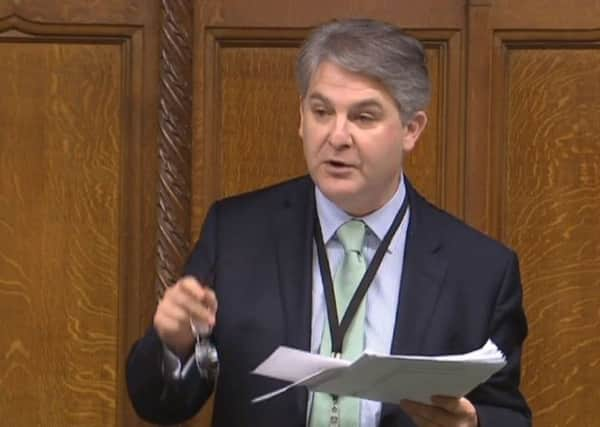Dani Garavelli: Lone howl of masculinity doesn't help men


His strategy for blocking campaigns is not to win opponents round with the power of his rhetoric, but to bang on like a pneumatic drill until heads explode and the bill times out.
For a politician who believes “political correctness” has robbed men of their voices, Davies doesn’t half make a racket. In the past, he has filibustered bills that would have forced landlords to make homes “fit for human habitation”, banned circuses from using wild animals and made first aid training compulsory in schools. It is hard to fathom someone who thinks the most effective use of his position as an MP is to defend Thomas Chipperfield’s right to keep big cats in small cages, but, given he also stymied a bill which would have secured free parking for the carers of hospital patients, it’s safe to say empathy is not his strongest suit.
Advertisement
Hide AdAdvertisement
Hide AdWhat gets Davies really riled, though, is women. He hates “zealous” feminists, and by “zealous” he means anyone who backs such outrageous goals as equal pay and a better deal for rape victims. So, last week, he tried again to filibuster SNP MP Eilidh Whiteford’s bill compelling the UK government to ratify the Istanbul Convention – a ground-breaking legal framework aimed at tackling sexual and domestic violence against women. At the second Commons reading in December, the bill had passed by 135-2, despite Davies speaking for 77 minutes. On Friday, he upped his game, speaking for 91 minutes, and introducing 50 wrecking amendments, before he was shut down by a closure motion. The bill passed 138-1, with Davies’ dissent a lone howl of masculine self-absorption.
Like all Men’s Rights Activists (MRAs), Davies would have us believe he is motivated not by bone-deep misogyny but by a concern that – as women fight for their rights – the suffering of men is being ignored. He says the Istanbul Convention is “sexist” and, while of course he opposes domestic violence against women, any strategy to tackle it should be gender-neutral.
But like all MRAs, he is a master of equivocation, using his own subverted notion of equality as a cover for his loathing of the “monstrous regiment”, and legitimate issues, such as boys’ declining performance at school , as a stick with which to poke feminists. In doing so, he presents human rights as a zero sum game in which support for one oppressed group necessarily comes at the expense of another.
Statistics alone expose the extent to which Davies’ perspective on domestic violence is warped. For all the work that has been done in this area, two women a week still die at the hands of their partner in the UK. This equates to more than 460 in the period since the UK signed up to the Istanbul Convention in June 2012.
But the way the victims of such acts of violence are judged is better captured in individual stories. Just days before Davies subjected Parliament to his latest tirade, Ian Stewart was jailed for life for the murder of his fiancée, children’s writer Helen Bailey, whom he drugged and killed and dumped in a cesspit. Her friends describe her as lovely and vivacious. Yet some newspapers reported her death as if – by virtue of being lonely and “naive” – she had played into his hands; as if not being attacked by the man who claimed to love her was an unreasonable expectation. Perhaps the UK does have a better record on violence against women than many other countries, but we have a long, long way to go.
Just as sexual and domestic violence disproportionately affects women, there are problems that disproportionately affect men. Working-class boys are being failed by our education system and middle-aged men are more likely to take their own lives. But these problems were not caused by feminism. Rooted in social disintegration, they are almost certainly exacerbated by a macho culture that discourages boys from being “swots” and men from expressing their emotions.
They are also are being tackled at grassroots levels by organisations that have no truck with the hostile language of the men’s rights movement; men, like former police officer John Carnochan, who campaigns for more male role models and against damaging gender stereotypes, without ever feeling the need to denigrate women.
So what has Davies done to help those disenfranchised males he cares so much about ? Well, last year he secured a parliamentary debate on International Men’s Day. But – while male suicide and bias in custody battles did get a mention – he and his conservatives allies spent most of their time lambasting “positive discrimination” and pretending the gender pay gap was a figment of women’s imagination.
Advertisement
Hide AdAdvertisement
Hide AdFor all his grandstanding, Davies is just a troll. Only a troll would get themselves appointed to the Women and Equalities Committee in order to argue that the reference to “women” should be excised from its name, or claim not to be an MRA while supporting Justice for Men and Boys – an organisation so keen on human rights it runs a “lying feminist of the month” competition.
As Whiteford’s resounding victory demonstrates, Davies’ misogyny is little more than a gnat in the face of the women’s movement. The less obvious sexism – the insidious prejudice that bleeds into everyday life – is far more of a threat to equality than the ravings of an attention-seeking troglodyte.
Davies, however, does a disservice to those who are committed to improving the lives of men: organisations such as CALM (the Campaign Against Living Miserably), the Movember Foundation, or the Men’s Sheds Association, which tackles isolation amongst male OAPs. By reducing their causes to click-bait, he undermines their efforts. Davies may believe men are now the “silent sex”, but if I were campaigning around such issues, I’d be urging him to zip it.